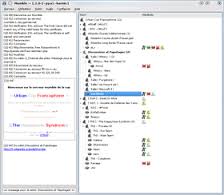记忆方法
将“mumble”分解为“mu”和“umble”,想象一个人因为口齿不清(“mu”像是要遮住嘴巴)而说话含糊不清(“umble”暗示说话的方式是拖沓或打结)。这种方法通过视觉和听觉联想帮助你记住单词的含义。
以上内容由AI生成, 仅供参考和借鉴
中文词源
mumble 嘟哝
来自mum,嘟哝声,使闭嘴,-le,表反复。插入字母b,比较number,numberous.
英语词源
- mumble
-
mumble: see mumps
- mumble (v.)
- early 14c., momelen, "to eat in a slow, ineffective manner" (perhaps "to talk with one's mouth full"), probably frequentative of interjection mum. The -b- is excrescent. Meaning "to speak indistinctly" is from mid-14c. Related: Mumbled; mumbling.
- mumble (n.)
- 1902, from mumble (v.).
权威例句
- 1. "Well," he conceded, "I do sometimes mumble a bit."
- “嗯,”他承认道,“我有时候说话的确有点吐字不清。”
- 2. He could hear the low mumble of Navarro's voice.
- 他能听到纳瓦罗在小声咕哝。
- 3. For goodness'sakes, Lucy Marian, speak up! I can't abide children who mumble.
- 乖乖! 露西?玛丽安, 讲大声一点! 我最讨厌小孩子说话咕咕哝哝的.
- 4. I wish you wouldn't mumble I can't hear you clearly.
- 我希望你说话不要含含糊糊-我听不清你在讲什么.
- 5. The two small primary schools have amalgamated because both the small mumble.
- 两所学校由于学生人数少,合并了.
